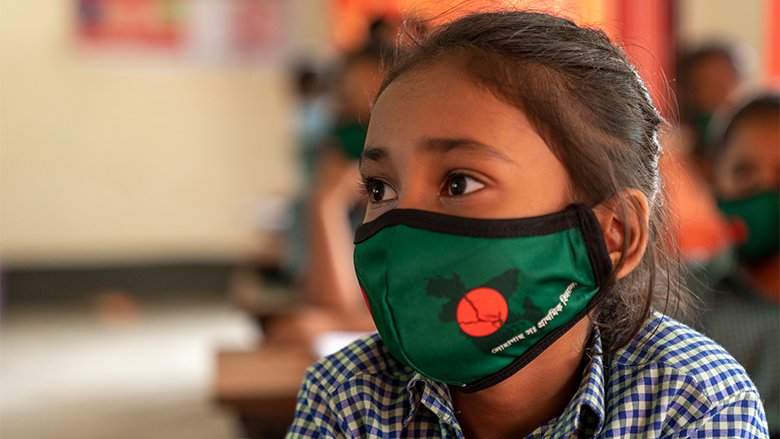The COVID-19 pandemic has had a significant impact on education systems around the world, resulting in school closures and disrupting the education of millions of children. Bangladesh was no exception, with one of the longest school closures of 18-months.The Government of Bangladesh with financial support from the Global Partnership for Education and technical assistance of the World Bank addressed the crisis through the COVID-19 School Sector Response (CSSR) Project. The project supported good practices in responding and recovering from the pandemic with the school system emerging as more resilient than it was before.

Empowered by transformative initiatives, the education system in Bangladesh emerged from the COVID-19 pandemic as stronger than before - encapsulated by the resilience of a young student determined to continue her education.
Tapash Paul / The World Bank
Key Highlights
- Advancing Remote Learning: The COVID-19 School Sector Response (CSSR) project supported 3.26 million children with distance learning programs, that include over 5,000 digital contents for different subjects for pre-primary to grade 10 across multiple platforms.
- Empowering Teachers: To improve teaching practices in the post-pandemic context, nearly 3,000 school teachers received professional development training on delivering the curriculum online, formative and summative assessments, remedial education, and supporting mental health and well-being.
- Strengthening School Facilities and Safety: Over 19,500 government primary schools received sub-grants for improving basic hygiene facilities.
Multimedia
The CSSR project helped strengthen the school system's institutional capacity to respond to and recover from the COVID-19 crisis and build resilience to face future crises from pre-primary to secondary levels. It helped around 3.26 million children, including 1.69 million girls continue education through distance learning programs. The project also helped develop more than 5,000 digital contents covering a total of 35 subjects, across all the different classes from pre-primary to grade 10, for television, radio, online and mobile platforms. This resulted in a unified digital remote learning system for students at this level.
The project design was based on global best practices, insights from experts, NGOs, and latest evidence on pandemic response. It prioritized inclusivity, capacity building, and a unified approach to remote learning across pre-primary, primary, and secondary education. Around 950 primary and secondary teachers received training for delivering the curriculum online and accommodate diverse learning needs.
Professional development need of teachers in managing post-pandemic classrooms was also central to the project’s aim to support learning recovery. Around 1,993 primary school teachers received training on formative and summative assessments and remedial education. These trainings are especially important in a post-COVID context, as for teachers to effectively instruct, they must have a strong understanding of their students’ learning levels and acquired skills to teach to their specific needs.
During the pandemic and school closures, mental health issues became more pronounced among the students. The teachers received training on mental health and stress management, with an aim to create a healthier learning environment.
Over 19,500 government primary schools in 329 upazilas (sub-districts) received subgrants from the project to improve the basic hygiene facilities in schools in remote, vulnerable, and high-poverty areas. The schools used the resources for ensuring safety procedures in reopened schools, which subsequently alleviated parents’ fears about sending their children back to school. This helped significantly reduce school dropouts. More than 90 percent of the students, who were enrolled in grant-supported pre-primary and primary level government schools before the COVID-19 pandemic, returned to schools.
"We received many helpful resources through the program. For example, cleaning materials, rules for handwashing, or guidelines on how we could protect ourselves and stay safe.”
Ishrat Jahan
Teacher, Cantonment Government Primary School, Dhaka
The CSSR project has been an example successful collaboration for the first time between the two education ministries, development partners and civil society working together in tackling the pandemic’s impact on education in a holistic manner.



